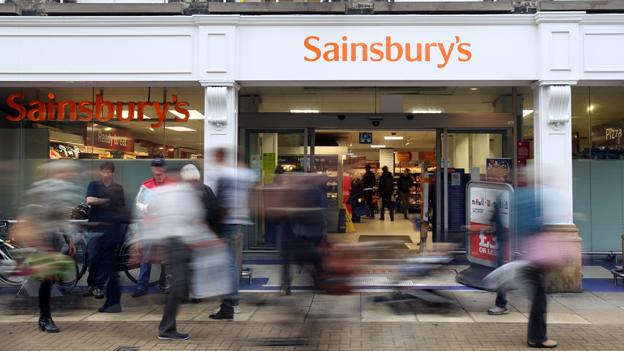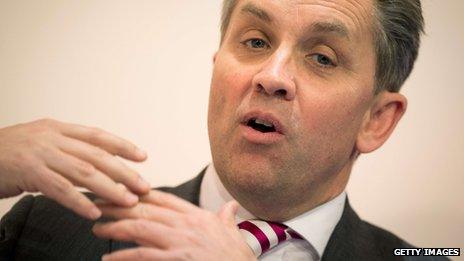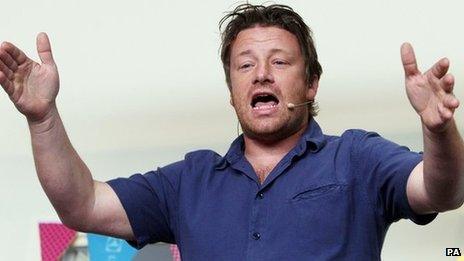Five ways Justin King turned around Sainsbury's
- Published

Sainsbury's chief executive Justin King has announced he will step down as head of the supermarket chain in July, after 10 years of transformation. How has he altered the retailer's fortunes, asks Chris Stokel-Walker.
1. He looked inwards. The first year King took over running the supermarket, Sainsbury's had just invested huge sums in an IT system that didn't work. "The shops didn't have the stuff on the shelf that people needed," says Graham Soult, a retail analyst. King fixed the system and ensured shelves were well-stocked. It was a sign of his mentality - make the basics work.
Tesco has been chastened by its aborted expansion into foreign markets - particularly its desire to crack the US. King had no such delusions of grandeur - he was given a company in the doldrums, and was focused on fixing it. As Tesco went stateside, King pulled the plug on Shaw's, Sainsbury's US expansion. And King looked inwards in another way. A strong focus on own-brand food has paid off for Sainsbury's - its 2013 half-year sales showed that its Taste the Difference and By Sainsbury's ranges were outselling branded food two-to-one.
2. Build, build, build. In 2004, as King took over as chief executive, Sainsbury's had 583 stores. He'll leave it with double that number. In fact, take off the 596 convenience stores Sainsbury's owns around the country - almost half the retailer's total number of shops - and you're still left with 583 full-sized supermarkets.

When King joined, Sainsbury's was increasing its national floor space at a rate of around 2% a year. By the end of 2005 he pledged to double that, then four years later pledged to double it again, all while ensuring the company remained competitive online. Success has shown at the tills - for 36 consecutive quarters sales have grown at the retailer.
3. Convenience is key. King leaves the company with more smaller stores than supermarkets, having managed to foresee that the way Britons shop has changed. "Sainsbury's isn't struggling with large stores," says Soult. "It's got the mix right. People are looking around for bargains, and they're more willing to pick and choose from different retailers. People live busy lives, too - we need convenience."
A third of the population of the UK are within a 15-minute drive of a Sainsbury's branch. For the fourth year in a row Sainsbury's was named convenience chain of the year, and in 2013 it was the Retail Industry Awards' supermarket of the year.
4. Quality/value balance. Until 1995, Sainsbury's was the supermarket of choice for Britons. Then Tesco changed the face of retail, including a focus on Tesco Value ranges. Sainsbury's had fallen to third place in the supermarket standings. Last year, after 10 years of trying, Sainsbury's managed to surpass Asda to regain the number two spot, with a 17% market share (though Sainsbury's still remains a long way behind Tesco, which has 29% of the market according to Kantar Worldpanel).

Sainsbury's has always been thought of as selling slightly higher quality items, which limited its customer base. In July 2003, less than 10% of the working-class and out-of-work population shopped there. The implementation of Sainsbury's Brand Match policy has widened its appeal without putting off its core audience. "There's a successful blend of being a quality brand, but being accessible and warm," says Soult.
5. Keeping big names. The era of the celebrity chef proved helpful for Sainsbury's under King. The retailer's partnership with Jamie Oliver looked to be on the rocks as King took his seat at the executive table. Oliver, who had been advertising Sainsbury's products since June 2000, was thought to be dated, and consistently topped polls of the most annoying adverts on television. But King committed further to Oliver, confident that he was good for business, and was proved right.
In 2005 Oliver launched his school meals crusade and bounced back into the public consciousness. Sainsbury's benefited by association. The same happened with the company's sponsorship of the Paralympics in 2012.
"If you were to look back 10 years," explains Soult, "the Sainsbury's brand was muddled. Now it's much more focused - more so than Tesco, Asda or Morrisons." That may be Justin King's biggest legacy.
Follow @BBCNewsMagazine, external on Twitter and on Facebook, external